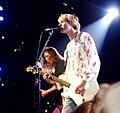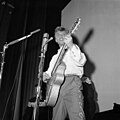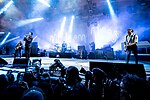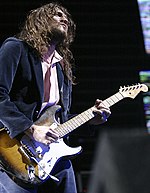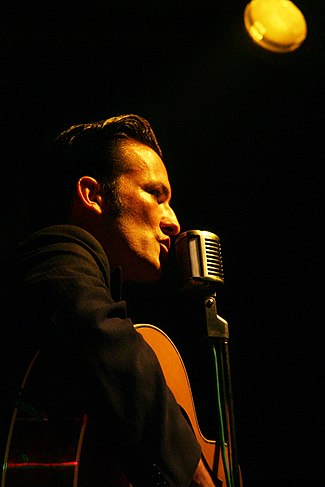Portal:Rock music
The Rock Music Portal
Rock is a broad genre of popular music that originated as "rock and roll" in the United States in the late 1940s and early 1950s, developing into a range of different styles from the mid-1960s, particularly in the United States and the United Kingdom. It has its roots in 1940s and 1950s rock and roll, a style that drew directly from the genres of blues, rhythm and blues, and from country music. Rock also drew strongly from genres such as electric blues and folk, and incorporated influences from jazz and other musical styles. For instrumentation, rock is centered on the electric guitar, usually as part of a rock group with electric bass guitar, drums, and one or more singers. Usually, rock is song-based music with a 4
4 time signature using a verse–chorus form, but the genre has become extremely diverse. Like pop music, lyrics often stress romantic love but also address a wide variety of other themes that are frequently social or political. Rock was the most popular genre of music in the U.S. and much of the Western world from the 1950s to the 2010s.
Rock musicians in the mid-1960s began to advance the album ahead of the single as the dominant form of recorded music expression and consumption, with the Beatles at the forefront of this development. Their contributions lent the genre a cultural legitimacy in the mainstream and initiated a rock-informed album era in the music industry for the next several decades. By the late 1960s "classic rock" period, a few distinct rock music subgenres had emerged, including hybrids like blues rock, folk rock, country rock, Southern rock, raga rock, and jazz rock, which contributed to the development of psychedelic rock, influenced by the countercultural psychedelic and hippie scene. New genres that emerged included progressive rock, which extended artistic elements, and glam rock, which highlighted showmanship and visual style. In the second half of the 1970s, punk rock reacted by producing stripped-down, energetic social and political critiques. Punk was an influence in the 1980s on new wave, post-punk and eventually alternative rock.
From the 1990s, alternative rock began to dominate rock music and break into the mainstream in the form of grunge, Britpop, and indie rock. Further fusion subgenres have since emerged, including pop-punk, electronic rock, rap rock, and rap metal. Some movements were conscious attempts to revisit rock's history, including the garage rock/post-punk revival in the 2000s. Since the 2010s, rock has lost its position as the pre-eminent popular music genre in world culture, but remains commercially successful. The increased influence of hip-hop and electronic dance music can be seen in rock music, notably in the techno-pop scene of the early 2010s and the pop-punk-hip-hop revival of the 2020s. (Full article...)
General images -
Selected article
Arctic Monkeys were heralded as one of the first bands to come to public attention via the Internet, with commentators suggesting they represented the possibility of a change in the way in which new bands are promoted and marketed. Their debut album, Whatever People Say I Am, That's What I'm Not (2006), received widespread critical acclaim upon release and topped the UK Albums Chart, becoming the fastest-selling debut album in British chart history at the time. It won Best British Album at the 2007 Brit Awards and has since been hailed as one of the greatest debut albums. The band's second album, Favourite Worst Nightmare (2007), was also acclaimed by critics and won Best British Album at the 2008 Brit Awards. They went on to release Humbug (2009) and Suck It and See (2011), both of which were well-received critically, though not to the extent of their first two albums.
The band's wider international fame came with the success of their critically acclaimed fifth album AM (2013), which was supported by the global hit "Do I Wanna Know?". It topped four Billboard charts and was certified 3× platinum in the US by the Recording Industry Association of America (RIAA). At the 2014 Brit Awards, the album became their third to win British Album of the Year. Their sixth album, Tranquility Base Hotel & Casino (2018), was a major departure from the band's previous guitar-heavy work, instead being piano-oriented. Their seventh album, The Car, was released in 2022 and received nominations for the Ivor Novello Awards and the Mercury Prize in 2023. It received a Best Alternative Music Album nomination at the 66th Annual Grammy Awards, their third to do so, and their second consecutive nomination after Tranquility Base Hotel & Casino.
In the United Kingdom, the band became the first independent-label band to debut at number one in the UK with their first five albums. The band have won seven Brit Awards; winning Best British Group and British Album of the Year three times, becoming the first band to ever "do the double" —that is, win in both categories— three times; a Mercury Prize for Whatever People Say I Am, That's What I'm Not, an Ivor Novello Award and 20 NME Awards. In addition, they have been nominated for nine Grammy Awards, and received Mercury Prize nominations in 2007, 2013, 2018 and 2023. Both Whatever People Say I Am, That's What I'm Not and AM are included in NME and different editions of Rolling Stones lists of the "500 Greatest Albums of All Time". ('Full article...)
Selected biography
Frusciante joined the Chili Peppers at the age of 18 after the death of guitarist Hillel Slovak, and first appeared on their album Mother's Milk (1989). His second album with the band, Blood Sugar Sex Magik (1991), was their breakthrough success. Overwhelmed by the band's newfound popularity, he quit in 1992. He became a recluse and entered a period of heroin addiction, during which he released his first solo recordings: Niandra LaDes and Usually Just a T-Shirt (1994) and Smile from the Streets You Hold (1997). In 1998, he completed drug rehabilitation and rejoined the Chili Peppers, taking them to major success with their albums Californication (1999), By the Way (2002) and Stadium Arcadium (2006).
Frusciante's solo work encompasses genres including experimental rock, ambient music, and electronica. He released six albums in 2004, each exploring different genres and recording techniques. In 2009, Frusciante released The Empyrean, which features members of the Chili Peppers. Frusciante left the Chili Peppers again in 2009 and rejoined them in 2019. Frusciante also releases acid house under the alias Trickfinger. With the ex-Chili Peppers guitarist Josh Klinghoffer and Joe Lally, Frusciante has released two albums as Ataxia. (Full article...)
Selected album
Indestructible is the fourth studio album by American heavy metal band Disturbed. A self-produced effort, Indestructible is the first Disturbed album that did not feature Johnny K, the producer of Disturbed's previous three albums, The Sickness, Believe, and Ten Thousand Fists. Indestructible was recorded at Groovemaster Studios in Chicago, Illinois. The album features two songs, "Perfect Insanity" and "Divide", that were written by Disturbed prior to their first album, The Sickness, but were never previously released.
The album shows Disturbed abandoning the nu metal sound prominent on previous three albums and features significantly darker themes than any of their previous work, according to the band. Some of the lyrical themes involve actual experiences that vocalist David Draiman had endured over the course of the past few years prior to making the album, including "bad relationships", a motorcycle accident that he was involved with, and an incident of suicide. To match the aggressive attitude and nature of said themes, Draiman told the other band members to create darker, more textural music than they have before. Despite these themes, the title track, "Indestructible", is meant to encourage those in the military that are fighting in wars and boost their morale.
Indestructible was released on June 3, 2008 in CD format, and also as two different limited edition and special edition digipaks, debuting at number one on the Billboard 200, making it the third consecutive number one debut by Disturbed on that chart, which had only been achieved by five other rock bands prior to the album's release. The album also shipped over 253,000 units in its opening week. Indestructible was met with mixed reviews by critics, earning a score of 57% on review-aggregating website Metacritic, based on six reviews. The album was certified Platinum by the Recording Industry Association of America in April 2009 for shipping over 1,000,000 copies in the United States. The single "Inside the Fire" was nominated for a 2009 Grammy Award in the "Best Hard Rock Performance" category. (Full article...)
Selected song
"Hotel California" is a song by American rock band Eagles, released as the second single of their album of the same name on February 22, 1977. The song was written by Don Felder (music), Don Henley, and Glenn Frey (lyrics), featuring Henley on lead vocals and concluding with an iconic 2 minute and 12 seconds long electric guitar solo performed by Felder with a Gibson Les Paul Gibson EDS-1275 double neck and Joe Walsh with a Fender Telecaster, in which they take turns playing the lead before harmonizing and playing arpeggios together towards the fade-out.
The song is one of the best-known recordings by the band, and in 1998 its long guitar coda was voted the best guitar solo of all time by readers of Guitarist. The song was awarded the Grammy Award for Record of the Year in 1978. The meaning of the lyrics of the song has been discussed by fans and critics ever since its release, the Eagles themselves described the song as their "interpretation of the high life in Los Angeles." In the 2013 documentary History of the Eagles, Henley said that the song was about "a journey from innocence to experience ... that's all."
Since its release, "Hotel California" has been widely regarded as one of the greatest rock songs of all time, and has been covered by many artists. Julia Phillips proposed adapting the song into a film, but the members of the Eagles disliked the idea and it never came to fruition. Commercially, "Hotel California" reached the number one position on the Billboard Hot 100 and reached the top ten of several international charts. The Eagles have performed "Hotel California" well over 1,000 times live, and is the third most performed of all their songs, after "Desperado" and "Take It Easy". (Full article...)
Selected picture
Did you know (auto-generated)

- ... that during his tenure as Governor of Central Java, Muhammad Ismail banned rock music concerts and car rallies?
- ... that Desulfovibrio vulgaris can remove toxic heavy metals from the environment?
- ... that the Liverpool Echo described British rock and roll star Tommy Steele as "quite unable to sing and play the guitar at the same time" when reviewing his first album?
- ... that the heavy metal band Cradle of Filth released a T-shirt that was so offensive that several people were arrested for wearing it?
- ... that before charting on the UK Albums Chart with Are We There Yet?, the indie rock musician James Marriott had made a career of mocking other YouTubers' music?
- ... that the British rock musician Hannah Grae went viral online with an anti-sexual harassment parody of Aqua's "Barbie Girl"?
Selected genre
Chamber pop (also called baroque pop and sometimes conflated with orchestral pop or symphonic pop) is a music genre that combines rock music with the intricate use of strings, horns, piano, and vocal harmonies, and other components drawn from the orchestral and lounge pop of the 1960s, with an emphasis on melody and texture. (Full article...)
Selected audio
Related portals
WikiProjects
Things you can do
Expand: College rock, Electronic rock, Pop rock
Clean Up: Instrumental rock, Rap rock, New wave, Industrial rock, Progressive metal, Southern rock, Folk rock, Funk rock, Space rock
Add Sources: Pagan rock
Join one of the many WikiProjects pertaining to Rock music.
News
No recent news
More articles -
Aftermath is the fourth studio album by the English rock band the Rolling Stones. The group recorded the album at RCA Studios in California in December 1965 and March 1966, during breaks between their international tours. It was released in the United Kingdom on 15 April 1966 by Decca Records and in the United States in late June or early July 1966 by London Records. It is the band's fourth British and sixth American studio album, and closely follows a series of international hit singles that helped bring the Stones newfound wealth and fame rivalling that of their contemporaries the Beatles.
Aftermath is considered by music scholars to be an artistic breakthrough for the Rolling Stones. It is their first album to consist entirely of original compositions, all of which were credited to Mick Jagger and Keith Richards. The band's original leader Brian Jones reemerged as a key contributor and experimented with instruments not usually associated with popular music, including the sitar, Appalachian dulcimer, Japanese koto and marimbas, as well as playing guitar and harmonica. Along with Jones' instrumental textures, the Stones incorporated a wider range of chords and stylistic elements beyond their Chicago blues and R&B influences, such as pop, folk, country, psychedelia, Baroque and Middle Eastern music. Influenced by intense love affairs, tensions within the group and a demanding touring itinerary, Jagger and Richards wrote the album around psychodramatic themes of love, sex, desire, power and dominance, hate, obsession, modern society and rock stardom. Women feature as prominent characters in their often dark, sarcastic, casually offensive lyrics. (Full article...)More did you know...
- ... that David Bowie's first gig as lead singer was at the Green Man, Blackheath?
- ... that Carlton le Willows Academy alumni include cricketer Mark Footitt, Air Supply singer/guitarist Graham Russell, and balloonist Janet Folkes?
- ... that the video for Marilyn Manson's soft-rock ballad "Running to the Edge of the World" was widely condemned for its depiction of violence against women?
- ... that Susan Beschta was a punk rocker and federal judge?

- ... that the FM Non-Duplication Rule adopted by the FCC 60 years ago led to the creation of the album-oriented and classic rock radio formats?
- ... that The Elvis Dead, a retelling of Evil Dead II in the style of Elvis Presley, features songs such as "Standing in a State of Shock", "I've Been Possessed", and "Wrapped Up in Vines"?
Major topics
Subcategories
Associated Wikimedia
The following Wikimedia Foundation sister projects provide more on this subject:
-
Commons
Free media repository -
Wikibooks
Free textbooks and manuals -
Wikidata
Free knowledge base -
Wikinews
Free-content news -
Wikiquote
Collection of quotations -
Wikisource
Free-content library -
Wikiversity
Free learning tools -
Wikivoyage
Free travel guide -
Wiktionary
Dictionary and thesaurus


